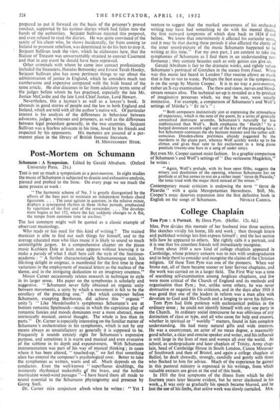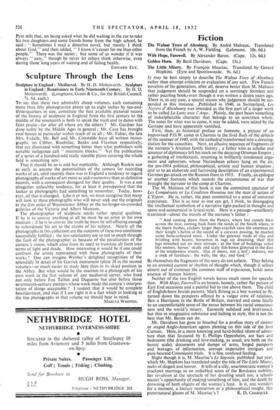College Chaplain
Tom Pym : A Portrait. By Dora Pym. (Heifer. 12s. 6d.) MRS. PYM divides this memoir of her husband into three sections. She sketches vividly his home, life and work ; then through letters and published writings lets him express himself ; and the last section tells how he appeared to others. She rightly calls it a portrait, and it is one that his countless friends will immediately recognise.
From about 1910 a new kind of college chaplain appeared in Cambridge, whose primary concern was to mix with undergraduates and to help thentto consider and recognise the claims of the Christian religion. Of these Tom Pym was one of the pioneers. When war broke out, all of them became sooner or later Service chaplains, and the work was carried on in a larger field. The First War was a time of searching self-examination among Anglican chaplains, and few were more critical of the Church of England and its methods and organisation than Pym ; but, unlike some others, he was never destructive or negative in his criticism, and in the days after 1918 it was good that one of the leaders in reform was a man afire with devotion to God and His Church and a longing to serve his fellows.
Tom Pym had little patience with ecclesiastical politics in the ordinary sense ; he could not identify himself with any one party in the Church. In ordinary social intercourse he was oblivious of any distinction of class or type, and all who came for help and counsel, whether in spiritual or " worldly " matters, found in him complete understanding. He had many natural gifts and wide interests. He was a countryman, an actor of no mean degree, a reasonably good scholar, a clear and concise speaker and writer, and his influence is writ large in the lives of men and women all over the world. At school, as undergraduate and later chaplain of Trinity, Army chap- lain, head of Cambridge House in South London, Canon Missioner of Southwark and- then of Bristol, and again a college chaplain at Balliol, he dealt shrewdly, strongly, candidly and gently with those who flocked to him for advice. Much of the experience he gained in this pastoral ministry is expressed in his writings, from which valuable extracts are given at the end of this book. In 1931 the first symptoms of the illness from which lie died fourteen years later became evident, but he never slackened in his work. t4 It was only as gradually his speech became blurred, and he lost the use of his limbs, that active work was slowly curtailed. Mrs. Pym tells that, on being asked what he did waiting in the car to take his two daughters and some friends home from the high school, he said : " Sometimes I read a detective novel, but mostly I think about God," and then added, " I know it's easier for me than other people." There was the secret ; but some of us wonder if it was always " easy," though he never let others think otherwise, even during those long years of waiting and of failing health.
EDWARD ELY.



































 Previous page
Previous page